英语句型之省略句用法讲解
高中英语知识点归纳省略句的种类与用法
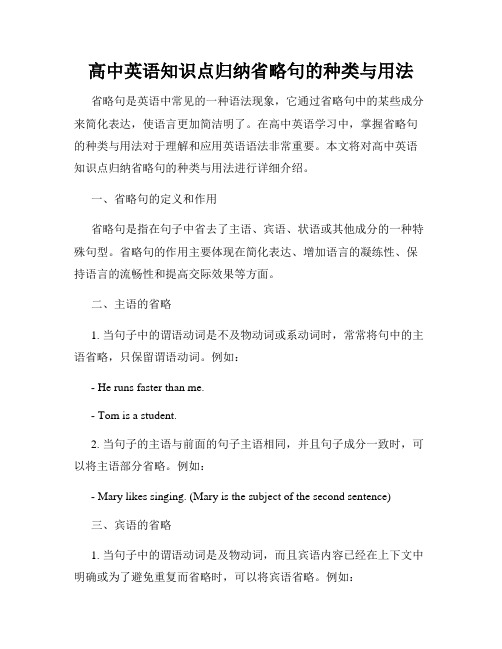
高中英语知识点归纳省略句的种类与用法省略句是英语中常见的一种语法现象,它通过省略句中的某些成分来简化表达,使语言更加简洁明了。
在高中英语学习中,掌握省略句的种类与用法对于理解和应用英语语法非常重要。
本文将对高中英语知识点归纳省略句的种类与用法进行详细介绍。
一、省略句的定义和作用省略句是指在句子中省去了主语、宾语、状语或其他成分的一种特殊句型。
省略句的作用主要体现在简化表达、增加语言的凝练性、保持语言的流畅性和提高交际效果等方面。
二、主语的省略1. 当句子中的谓语动词是不及物动词或系动词时,常常将句中的主语省略,只保留谓语动词。
例如:- He runs faster than me.- Tom is a student.2. 当句子的主语与前面的句子主语相同,并且句子成分一致时,可以将主语部分省略。
例如:- Mary likes singing. (Mary is the subject of the second sentence)三、宾语的省略1. 当句子中的谓语动词是及物动词,而且宾语内容已经在上下文中明确或为了避免重复而省略时,可以将宾语省略。
例如:- Can you speak French? Yes, I can. (French is the object of speak)四、状语的省略1. 当句子中的状语从句与主句的主语或宾语一致时,可以将状语从句中的主语或宾语省略。
例如:- He speaks English better than I (do). (I is the subject of do)- She likes swimming more than her sister (does). (Her sister is the subject of does)2. 当句子中的状语从句与主句的谓语动词一致时,可以将状语从句中的谓语动词省略。
例如:- I work harder than you (do). (Do is the verb of the subordinate clause)五、被动语态的省略1. 当句子中的被动语态中的被动助动词和be动词前面有介词时,可以将be动词和介词省略。
省略句的常见形式
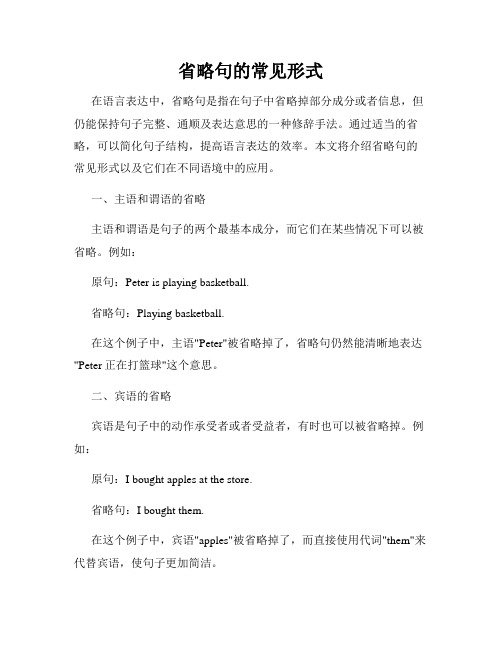
省略句的常见形式在语言表达中,省略句是指在句子中省略掉部分成分或者信息,但仍能保持句子完整、通顺及表达意思的一种修辞手法。
通过适当的省略,可以简化句子结构,提高语言表达的效率。
本文将介绍省略句的常见形式以及它们在不同语境中的应用。
一、主语和谓语的省略主语和谓语是句子的两个最基本成分,而它们在某些情况下可以被省略。
例如:原句:Peter is playing basketball.省略句:Playing basketball.在这个例子中,主语"Peter"被省略掉了,省略句仍然能清晰地表达"Peter正在打篮球"这个意思。
二、宾语的省略宾语是句子中的动作承受者或者受益者,有时也可以被省略掉。
例如:原句:I bought apples at the store.省略句:I bought them.在这个例子中,宾语"apples"被省略掉了,而直接使用代词"them"来代替宾语,使句子更加简洁。
三、定语从句的省略在定语从句中,有时可以省略掉关系词及部分成分。
例如:原句:The book that is on the table is mine.省略句:The book on the table is mine.在这个例子中,关系词"that"被省略掉了,句子依然能够明确地表达"在桌子上的那本书是我的"这个意思。
四、状语从句的省略状语从句中,如果主语和谓语在两个句子中没有变化,可以省略成分。
例如:原句:She told me that she would come tomorrow.省略句:She told me she would come tomorrow.在这个例子中,状语从句"that she would come tomorrow"中的主语和谓语与主句中的主语和谓语相同,可以省略掉"that"以及主语"she",句子仍然是完整的。
英语中省略句的用法与讲解

省略句(elliptical sentences )定义:省略句是英语的一种习惯用法。
按照语法的分析,句子应该具备的成分,有时出于修辞上的需要,为了避免重复、突出新信息使上下文紧密连接的修辞手段。
省略的部分:单词、短语、分句,都可以省略,而且各有一定的衔接关系,不容臆断一、哪些部分可以省略(一)省略单词1、省略介词He spe nt four hours (in) going over his less ons. 他花了四个小时复习功课。
I ' ve studied Eng1ish (for) five years. 我已学五年英语了。
2、省略连词I believe (that) you will succeed . 我相信你们会成功的。
It ' s a pity (that) he ' s leaving.他要走,真遗憾。
I ' m sure (that) she will help you.我肯定她会帮你的。
3、省略关系代词I ' ll give you all (that) I have.我要把我所有的一切都给你。
He read the book (which) I got yesterday.他看过我昨天买的书了。
二、省略句子成分1、省略主语Beg your pardon.(我)请你原谅。
(Beg前省略了主语I )Take care!当心!(Take前省略了主语you )Looks as if it will rain.看起来象要下雨。
(Looks前省略了主语it )2、省略谓语Who next?该谁了?(Who后面省略了谓语comes )The river was deep and the ice thin. (ice 后面省略了was )We ' ll do the best we can.我们将尽力而为。
(can后面省略了动词do )3、省略表语Are you ready? Yes, I am.你准备好了吗?我准备好了。
初中英语中的省略句用法解析

初中英语中的省略句用法解析省略句是英语语法中一种常见的句子结构,其特点是在表达完整的意思的前提下,省略了一些句子成分。
初中英语中的省略句用法十分常见,掌握这种句型的用法对于学生来说非常重要。
一、省略主语在口语中,我们经常会省略主语,因为主语已经通过上下文明确了。
例句1:What did you do yesterday? I went to the park.(你昨天做了什么?我去了公园。
)例句2:Have you finished your homework? Yes, I have.(你完成作业了吗?是的,我完成了。
)二、省略谓语在一些特定的情况下,我们可以省略谓语动词。
例句1:Can you swim? Yes, I can.(你会游泳吗?是的,我会。
)例句2:Do you like pizza? Yes, I do.(你喜欢比萨吗?是的,我喜欢。
)三、省略宾语当宾语是代词时,我们可以将宾语省略。
例句1:Did you see the movie? Yes, I did.(你看了那部电影吗?是的,我看了。
)例句2:I bought some apples. Would you like some?(我买了一些苹果。
你要吃一些吗?)四、省略连接词在复合句中,当主句和从句的主语相同时,我们可以省略连接词。
例句1:He is good at playing basketball and I am good at playing football.(他擅长打篮球,而我擅长踢足球。
)例句2:She likes singing and dancing.(她喜欢唱歌跳舞。
)五、省略定语从句中的关系词在定语从句中,当关系代词在从句中作宾语时,我们可以将关系代词和be动词一起省略。
例句1:The book (that) I borrowed from the library is very interesting.(我从图书馆借的那本书非常有趣。
如何正确使用省略句
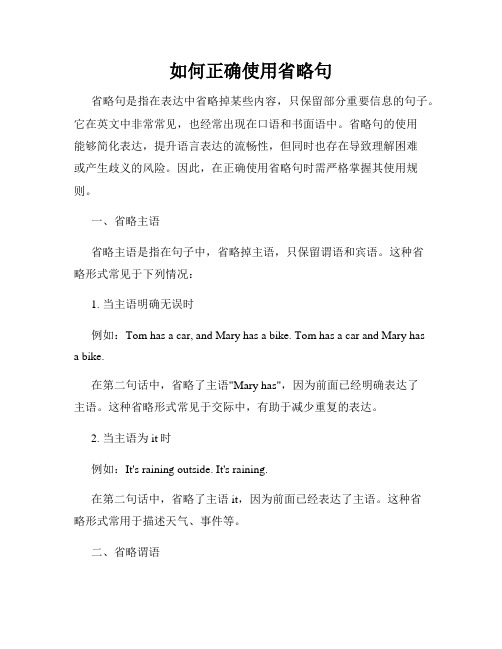
如何正确使用省略句省略句是指在表达中省略掉某些内容,只保留部分重要信息的句子。
它在英文中非常常见,也经常出现在口语和书面语中。
省略句的使用能够简化表达,提升语言表达的流畅性,但同时也存在导致理解困难或产生歧义的风险。
因此,在正确使用省略句时需严格掌握其使用规则。
一、省略主语省略主语是指在句子中,省略掉主语,只保留谓语和宾语。
这种省略形式常见于下列情况:1. 当主语明确无误时例如:Tom has a car, and Mary has a bike. Tom has a car and Mary has a bike.在第二句话中,省略了主语"Mary has",因为前面已经明确表达了主语。
这种省略形式常见于交际中,有助于减少重复的表达。
2. 当主语为it时例如:It's raining outside. It's raining.在第二句话中,省略了主语it,因为前面已经表达了主语。
这种省略形式常用于描述天气、事件等。
二、省略谓语省略谓语是指在句子中,省略掉谓语,只保留主语和宾语。
这种省略形式常见于下列情况:1. 当谓语明确无误时例如:I will go to school tomorrow, and you will too. I will go to school tomorrow and you will (go to school tomorrow too).在第二句话中,虽然省略了谓语"go",但是由于上下文中已经表达了谓语,因此省略形式也是正确的。
2. 当谓语动词重复时例如:She sings well, and he does too. She sings well and he sings well too.在第二句话中,谓语动词"sings"重复,因此可以省略掉谓语动词。
这种省略形式在书面语和口语中都经常出现。
中考英语省略句的归纳总结
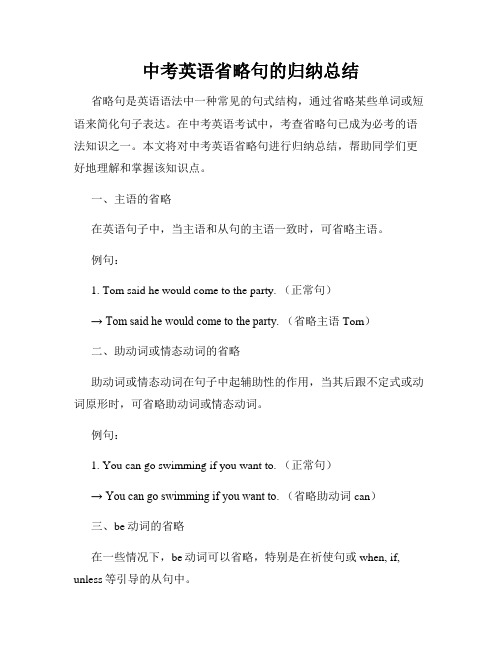
中考英语省略句的归纳总结省略句是英语语法中一种常见的句式结构,通过省略某些单词或短语来简化句子表达。
在中考英语考试中,考查省略句已成为必考的语法知识之一。
本文将对中考英语省略句进行归纳总结,帮助同学们更好地理解和掌握该知识点。
一、主语的省略在英语句子中,当主语和从句的主语一致时,可省略主语。
例句:1. Tom said he would come to the party. (正常句)→ Tom said he would come to the party. (省略主语Tom)二、助动词或情态动词的省略助动词或情态动词在句子中起辅助性的作用,当其后跟不定式或动词原形时,可省略助动词或情态动词。
例句:1. You can go swimming if you want to. (正常句)→ You can go swimming if you want to. (省略助动词can)三、be动词的省略在一些情况下,be动词可以省略,特别是在祈使句或when, if, unless等引导的从句中。
例句:1. Be quiet and listen to the teacher. (正常句)→ Be quiet and listen to the teacher. (省略be动词)四、状语的省略当主句和从句之间的时间状语、地点状语、方式状语等相同或相似时,可将其在从句中省略。
例句:1. He lives in Beijing and I live in Beijing. (正常句)→ He lives in Beijing and I do too. (省略相同的地点状语in Beijing)五、连接词的省略在句子中,连接词如and, but, or等可以省略,特别是在并列句中。
例句:1. She is tall and she is thin. (正常句)→ She is tall and thin. (省略连接词and)六、祈使句中的省略在祈使句(祈使句用于表达命令、请求、劝告等)中,主语you可以省略。
【英语知识点】英语省略句语法总结及例句

【英语知识点】英语省略句语法总结及例句英语中的省略是为了避免重复、突出新信息并使上下文紧密连接的一种语法修辞手段。
省略在英语语言中,尤其在对话中,是一种十分普遍的现象。
省略句是英语的一种习惯用法。
1.省略介词:I've studied English (for) five years.我已学五年英语了。
2.省略连词that:I believe (that) you will succeed.我相信你们会成功的。
3.省略关系代词:I'll give you all (that) I have.我要把我所有的一切都给你。
1.省略主语:(You) Open the door,please.请开一下门。
2.省略谓语:Who (es) next?该谁了?3.省略主谓语或主谓语的一部分:(There is) No smoking.禁止抽烟。
4.省略表语:Are you thirsty ? 你30岁了吗?Yes,I am (thirsty).是的,我是。
5.省略宾语:Let's do the dishes. I'll wash and you'll dry(dishes). 让我们洗碗吧,我来洗,你来揩干。
6.省略状语:He was not hurt. (how)Strange! 他没有受伤,真奇怪!7.同时省略几个成分:(I wish) Good luck (to you) .祝你好运/祝你顺利。
1.为避免重复而进行的省略。
当一个句子中有两个或更多相同的词、短语出现时,其中的第一个须保留,其余的往往省略,以达到避免重复、使句子简练的目的。
高考中尤其要注意的情况是:当时间状语从句、地点状语从句、方式状语从句、让步状语从句、条件状语从句等状语从句中的主语与主句的主语一致并含有be时,往往将该状语从句中的主语和be一同省略。
2.语法上的省略。
有些成分的省略是出于语法上的原因——使表述更为简明,例如:He got up at six (o’clock).他六点钟起床。
英语省略句讲解ppt课件

What they want to do is (that) they go to play basketball.
2、不定式符号to的省略
①、并列的不定式可省去后面的to。 e.g. I told him to sit down and wait for a moment.
9、情态动词should的省略
insist, order, command, suggest, propose, advise, demand, require, request, ask. It’s necessary/important/impossible/strange/ natural/a pity…
2、Omitting the Predicative(表语)
(1)–Is he a teacher ? --Yes, he is (a teacher ).
(2) His sister isn’t lazy, nor is his brother (lazy).
3. Omitting the Object(宾语)
10、同时省略几个成分。
e.g. Let’s meet at the same place as (we met) yesterday. ---- Have you finished your work? ---- (I have) Not (finished my work) yet.
(二)并列句中的省略
1、主句中有一些成分被省略。
e.g. (I’m) Sorry to hear that you are ill. (It is a) Pity that he missed such a good chance.
2、省略了一个从句或从句的一部分,用so或not (切不可用it或that)代替。
完整版英语省略句的六大总结

完整版英语省略句的六大总结
1.主语省略:当主语已经被上下文所明确时,可以省略主语。
例句:(原句)I am going to the bookstore.
(省略) Going to the bookstore.
2.谓语动词省略:当谓语动词已经被上下文所明确时,可以省略谓语动词。
例句:(原句)She can play tennis very well.
(省略) She can play very well.
3.宾语省略:当上下文中已明确了宾语时,可以省略宾语。
例句:(原句) Would you like to have some watermelon?
(省略) Would you like some?
4.介词省略:当介词与其宾语紧密相连,且已明确时,可以省略介词。
例句:(原句) We are waiting for you in the park.
(省略) We are waiting for you the park.
5.主语从句省略:当主语从句中的主语与句子的主语相同,可
以省略主语从句。
例句:(原句) That he could swim surprised me.
(省略) To swim surprised me.
6.定语从句省略:当定语从句中的关系代词为主语时,可以省略关系代词。
例句:(原句) The book that I borrowed from the library is very interesting.
(省略) The book I borrowed from the library is very interesting.。
英语省略句句子成分解析与用法
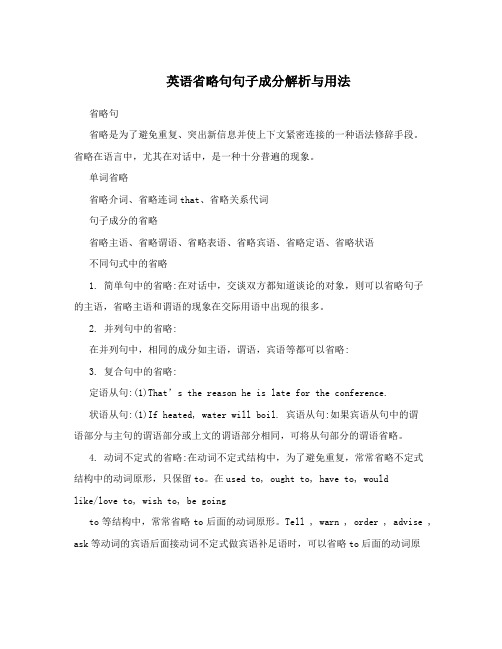
英语省略句句子成分解析与用法省略句省略是为了避免重复、突出新信息并使上下文紧密连接的一种语法修辞手段。
省略在语言中,尤其在对话中,是一种十分普遍的现象。
单词省略省略介词、省略连词that、省略关系代词句子成分的省略省略主语、省略谓语、省略表语、省略宾语、省略定语、省略状语不同句式中的省略1. 简单句中的省略:在对话中,交谈双方都知道谈论的对象,则可以省略句子的主语,省略主语和谓语的现象在交际用语中出现的很多。
2. 并列句中的省略:在并列句中,相同的成分如主语,谓语,宾语等都可以省略:3. 复合句中的省略:定语从句:(1)That’s the reason he is late for the conference.状语从句:(1)If heated, water will boil. 宾语从句:如果宾语从句中的谓语部分与主句的谓语部分或上文的谓语部分相同,可将从句部分的谓语省略。
4. 动词不定式的省略:在动词不定式结构中,为了避免重复,常常省略不定式结构中的动词原形,只保留to。
在used to, ought to, have to, wouldlike/love to, wish to, be goingto等结构中,常常省略to后面的动词原形。
Tell , warn , order , advise , ask等动词的宾语后面接动词不定式做宾语补足语时,可以省略to后面的动词原形。
5.虚拟条件句中的省略:在虚拟条件句中,如含有had,were,should等时,if 可省略,句子倒装状语从句中的省略用法than,as引导的比较状语从句中的省略用法?、以if从句为代表的状语从句中的特殊省略用法?、定语从句中的省略用法?、虚拟语气中if及should的省略?、不定式符号to的省略?、So和not的替代性省略?、日常交际中的省略省略句用法专项练习种类例句说明主语的省略Beautiful day (= It is a beautiful day), isn’t it?Pity we live so far from the sea. (It is a pity we live so far from the sea.)有时也可省略整个句子的主语和谓语,只保留次要成分。
英语句子中的省略的用法
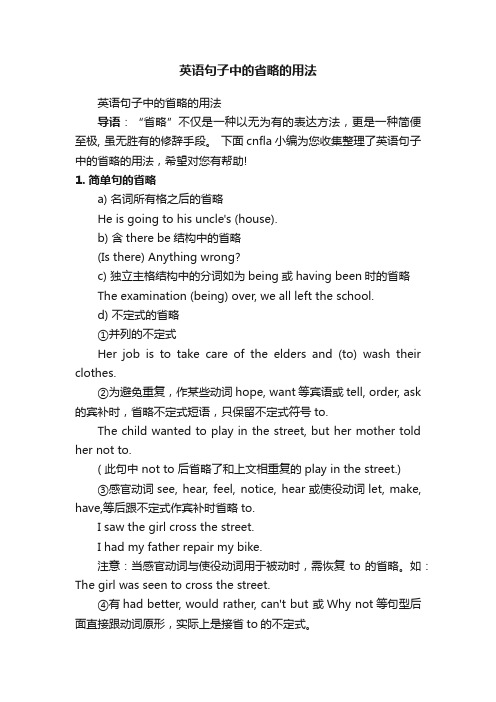
英语句子中的省略的用法英语句子中的省略的用法导语:“省略”不仅是一种以无为有的表达方法,更是一种简便至极, 虽无胜有的修辞手段。
下面cnfla小编为您收集整理了英语句子中的省略的用法,希望对您有帮助!1. 简单句的省略a) 名词所有格之后的省略He is going to his uncle's (house).b) 含there be结构中的省略(Is there) Anything wrong?c) 独立主格结构中的分词如为being或having been时的省略The examination (being) over, we all left the school.d) 不定式的省略①并列的不定式Her job is to take care of the elders and (to) wash their clothes.②为避免重复,作某些动词hope, want等宾语或tell, order, ask 的宾补时,省略不定式短语,只保留不定式符号to.The child wanted to play in the street, but her mother told her not to.( 此句中 not to 后省略了和上文相重复的play in the street.)③感官动词see, hear, feel, notice, hear或使役动词let, make, have,等后跟不定式作宾补时省略to.I saw the girl cross the street.I had my father repair my bike.注意:当感官动词与使役动词用于被动时,需恢复to的省略。
如:The girl was seen to cross the street.④有had better, would rather, can't but 或Why not等句型后面直接跟动词原形,实际上是接省to的不定式。
省略句的常见形式与解析
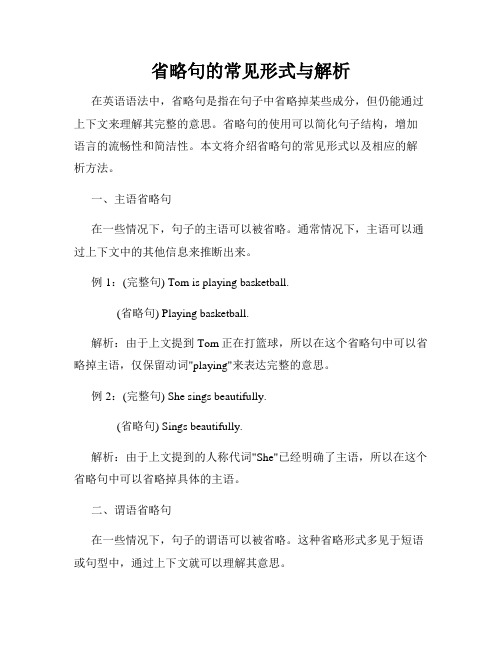
省略句的常见形式与解析在英语语法中,省略句是指在句子中省略掉某些成分,但仍能通过上下文来理解其完整的意思。
省略句的使用可以简化句子结构,增加语言的流畅性和简洁性。
本文将介绍省略句的常见形式以及相应的解析方法。
一、主语省略句在一些情况下,句子的主语可以被省略。
通常情况下,主语可以通过上下文中的其他信息来推断出来。
例1:(完整句) Tom is playing basketball.(省略句) Playing basketball.解析:由于上文提到Tom正在打篮球,所以在这个省略句中可以省略掉主语,仅保留动词"playing"来表达完整的意思。
例2:(完整句) She sings beautifully.(省略句) Sings beautifully.解析:由于上文提到的人称代词"She"已经明确了主语,所以在这个省略句中可以省略掉具体的主语。
二、谓语省略句在一些情况下,句子的谓语可以被省略。
这种省略形式多见于短语或句型中,通过上下文就可以理解其意思。
例1:(完整句) He can play the guitar, but I can't.(省略句) He can play the guitar, but I can't play (the guitar).解析:在这个省略句中,通过上文提到的主题"play the guitar",可以省略掉谓语"Not",而保留上文中的句意。
例2:(完整句) John lives in New York, and Mary in Los Angeles.(省略句) John lives in New York, and Mary in Los Angeles.解析:在这个省略句中,由于谓语"lives"已经在上文中出现过,因此可以省略掉后面的谓语,仅根据上下文理解出Mary的具体情况。
初中英语 省略句用法
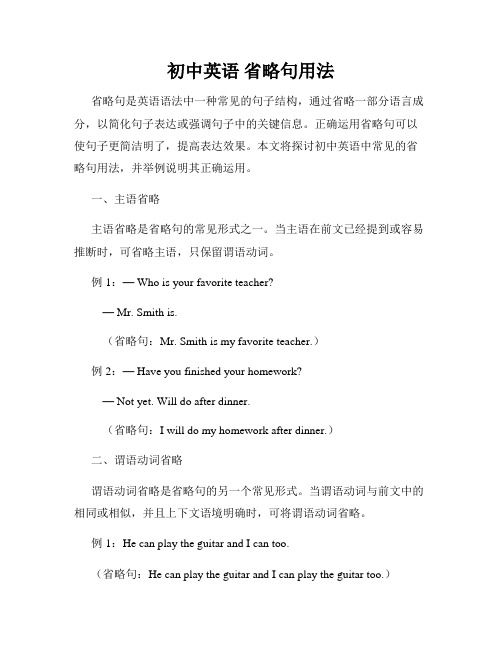
初中英语省略句用法省略句是英语语法中一种常见的句子结构,通过省略一部分语言成分,以简化句子表达或强调句子中的关键信息。
正确运用省略句可以使句子更简洁明了,提高表达效果。
本文将探讨初中英语中常见的省略句用法,并举例说明其正确运用。
一、主语省略主语省略是省略句的常见形式之一。
当主语在前文已经提到或容易推断时,可省略主语,只保留谓语动词。
例1:— Who is your favorite teacher?— Mr. Smith is.(省略句:Mr. Smith is my favorite teacher.)例2:— Have you finished your homework?— Not yet. Will do after dinner.(省略句:I will do my homework after dinner.)二、谓语动词省略谓语动词省略是省略句的另一个常见形式。
当谓语动词与前文中的相同或相似,并且上下文语境明确时,可将谓语动词省略。
例1:He can play the guitar and I can too.(省略句:He can play the guitar and I can play the guitar too.)例2:She likes singing and dancing, and her brother likes singing too.(省略句:She likes singing and dancing, and her brother likes singing too.)三、宾语省略宾语省略是省略句的又一常见形式。
当宾语在前文已经提到或容易推断时,可将宾语省略。
例1:— Did you get the message I left you?— Yes, received it.(省略句:Yes, I received the message.)例2:— Are you going to the concert with us?— Sorry, can't. Have another plan.(省略句:Sorry, I can't go to the concert with you. I have another plan.)四、介词短语省略在介词短语中,当后一个成分与前一个短语中的某个成分相同或相关时,可将重复的成分省略。
(完整版)英语中省略句的用法与讲解
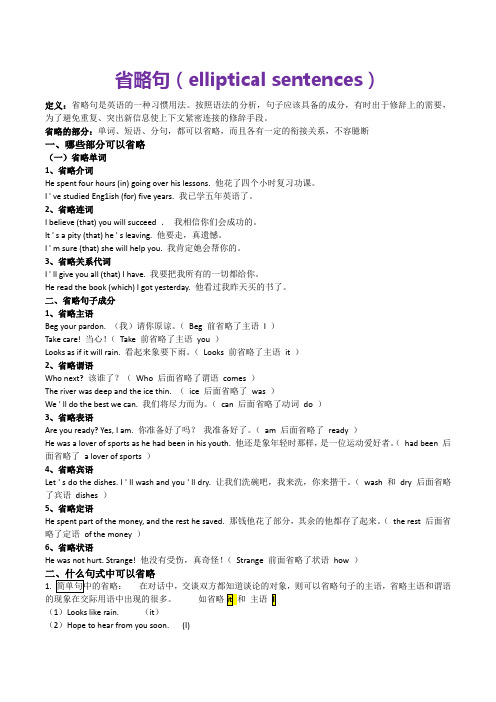
省略句(elliptical sentences)定义:省略句是英语的一种习惯用法。
按照语法的分析,句子应该具备的成分,有时出于修辞上的需要,为了避免重复、突出新信息使上下文紧密连接的修辞手段。
省略的部分:单词、短语、分句,都可以省略,而且各有一定的衔接关系,不容臆断一、哪些部分可以省略(一)省略单词1、省略介词He spent four hours (in) going over his lessons. 他花了四个小时复习功课。
I ' ve studied Eng1ish (for) five years. 我已学五年英语了。
2、省略连词I believe (that) you will succeed .我相信你们会成功的。
It ' s a pity (that) he ' s leaving. 他要走,真遗憾。
I ' m sure (that) she will help you. 我肯定她会帮你的。
3、省略关系代词I ' ll give you all (that) I have. 我要把我所有的一切都给你。
He read the book (which) I got yesterday. 他看过我昨天买的书了。
二、省略句子成分1、省略主语Beg your pardon. (我)请你原谅。
(Beg 前省略了主语I )Take care! 当心!(Take 前省略了主语you )Looks as if it will rain. 看起来象要下雨。
(Looks 前省略了主语it )2、省略谓语Who next? 该谁了?(Who 后面省略了谓语comes )The river was deep and the ice thin. (ice 后面省略了was )We ' ll do the best we can. 我们将尽力而为。
(can 后面省略了动词do )3、省略表语Are you ready? Yes, I am. 你准备好了吗?我准备好了。
高中英语知识点归纳省略句的特殊情况与应用
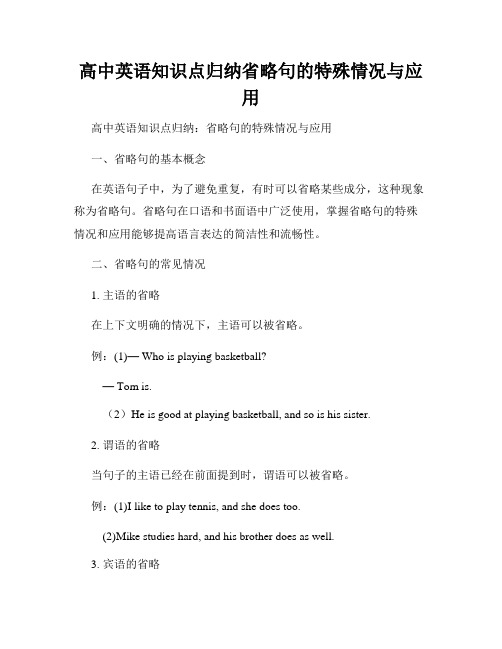
高中英语知识点归纳省略句的特殊情况与应用高中英语知识点归纳:省略句的特殊情况与应用一、省略句的基本概念在英语句子中,为了避免重复,有时可以省略某些成分,这种现象称为省略句。
省略句在口语和书面语中广泛使用,掌握省略句的特殊情况和应用能够提高语言表达的简洁性和流畅性。
二、省略句的常见情况1. 主语的省略在上下文明确的情况下,主语可以被省略。
例:(1)— Who is playing basketball?— Tom is.(2)He is good at playing basketball, and so is his sister.2. 谓语的省略当句子的主语已经在前面提到时,谓语可以被省略。
例:(1)I like to play tennis, and she does too.(2)Mike studies hard, and his brother does as well.3. 宾语的省略当句子的宾语已经在前面提到时,宾语可以被省略。
例:(1)— Have you finished your homework?— Yes, I have.(2)Tom is reading a book, and Mary is too.4. 定语的省略在某些情况下,定语可以被省略,特别是针对被修饰成分为人或物时。
例:(1)I bought some apples and ate them.(2)The flowers in the garden are beautiful, and those in the house are also lovely.5. 状语的省略在上下文中,有些状语可以被省略。
例:(1)I go to school by bus, and so does my brother.(2)She works hard, and sometimes I do too.6. 句子成分的省略在对话或长篇文章中,为了避免重复,可以省略前面出现过的句子成分。
初中英语知识点归纳省略句的构成和表达
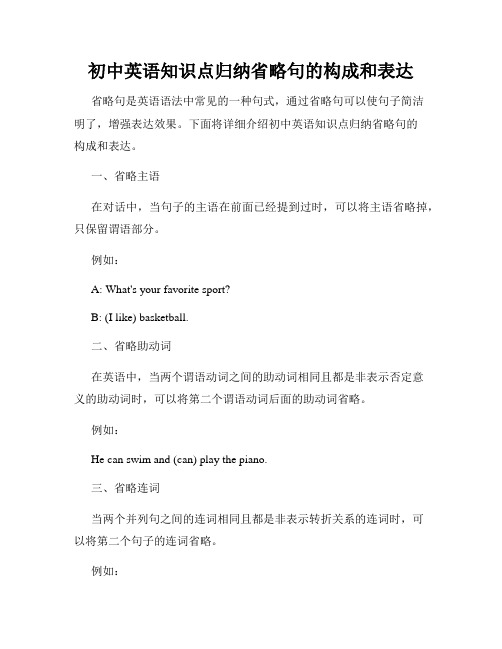
初中英语知识点归纳省略句的构成和表达省略句是英语语法中常见的一种句式,通过省略句可以使句子简洁明了,增强表达效果。
下面将详细介绍初中英语知识点归纳省略句的构成和表达。
一、省略主语在对话中,当句子的主语在前面已经提到过时,可以将主语省略掉,只保留谓语部分。
例如:A: What's your favorite sport?B: (I like) basketball.二、省略助动词在英语中,当两个谓语动词之间的助动词相同且都是非表示否定意义的助动词时,可以将第二个谓语动词后面的助动词省略。
例如:He can swim and (can) play the piano.三、省略连词当两个并列句之间的连词相同且都是非表示转折关系的连词时,可以将第二个句子的连词省略。
例如:I like playing basketball, (and) she likes playing tennis.四、省略谓语在英语中,当句子的主语与前面的句子的主语相同并且动词相同时,可以将第二个句子的谓语动词省略。
例如:She is a teacher, (she) teaches English.五、省略宾语在英语中,当两个句子的宾语相同且后一个句子的谓语动词是带有宾语的动词时,可以将后一个句子的宾语省略。
例如:I bought a book and (bought) some pens.六、省略介词短语当两个句子的主语相同并且后一个句子的介词短语与前一个句子中的介词短语相同时,可以将后一个句子的介词短语省略。
例如:I walked to school and (walked) home.七、省略不定式在英语中,当两个句子的主语相同并且后一个句子的动词是带有不定式的动词时,可以将后一个句子的不定式省略。
例如:She wants to dance and (wants) to sing.综上所述,初中英语知识点归纳省略句的构成和表达主要包括省略主语、助动词、连词、谓语、宾语、介词短语和不定式等。
英语中的省略句和省略句的规则

英语中的省略句是一种特殊的句型,通过省略部分句子成分,使句子更加简洁、流畅。
省略句的使用可以提高句子表达的效果,但也需要注意一些规则。
在英语中,常见的省略句有主语、谓语、宾语和其他成分的省略。
以下是一些常见的省略句规则:1.主语的省略当主语已经在上下文中明确指出时,可以省略主语。
例如:•Who is the winner? (Who: 主语)•Tom is. (Tom: 主语)2.谓语的省略当句子中的谓语动词与上文中的主谓一致时,可以省略谓语动词。
例如:•Have you finished your homework? (Have you: 谓语动词)•Yes, I have. (I have: 谓语动词)3.宾语的省略当宾语是不定式短语、动名词短语或从句时,有时可以省略宾语。
例如:•I want to eat some ice cream. (to eat some ice cream: 宾语)•I want to. (to: 宾语)•She enjoys swimming in the summer. (swimming in the summer: 宾语)•She enjoys it. (it: 宾语)4.其他成分的省略有些介词短语或副词短语在语境中已经明确,可以省略。
例如:•Peter is going to the supermarket. (to the supermarket: 介词短语)•So is Mary. (So: 其他成分)•He said he would visit us tomorrow. (tomorrow: 副词短语)•He said he would. (He: 其他成分)正如以上所述,省略句是一种简化语句结构的技巧,使句子更加简洁。
然而,省略句也有一些注意事项。
首先,省略句要根据上下文进行判断。
如果没有足够的上下文信息,可能会造成误解。
其次,省略句需要遵守语法规则。
(完整版)省略句语法讲义

省略句讲义定义在英语中,为了避免重复而省去某些重复的部分,这种现象叫省略。
如:Beg you pardon.Sounds like a good idea.一简单句中的省略1、省略主语祈使句中主语通常省略Doesn’t matter.2、省略主谓或主谓语的一部分。
如:What/How (do you think) about a cup of tea ?3、省略表语。
–Are you thirsty? – Yes, I am .His brother isn’t lazy, nor is his sister .4、同时省略几个成分Let’s meet at the same place as yesterday.–Have you finished your work ?–Not yet.二并列句中的省略1、两个并列句中,后一个分句常省略与前一分句中相同的部分。
My brother is a doctor and my sister-in-law (is) a lawyer. (省略相同的谓语动词)三复合句中的省略1、主句中有一些成分被省略,如:Sorry to hear you are ill.Pity that he missed such a good chance.常见的有:if possible. If necessary. What for? = why?主句中有一些成分被省略、而用so或not来代替-Are you leaving for Beijing this Sunday?-I think so.这种用法常见的有:How so? Why so? Is that so? I hope so. He said so.及I suppose/believe /hope not. Why not? If so. If not.等等。
2.宾语从句中的省略宾语从句中常省略连词that,但当有两个并列的宾语从句时,第二个that则不能省略。
- 1、下载文档前请自行甄别文档内容的完整性,平台不提供额外的编辑、内容补充、找答案等附加服务。
- 2、"仅部分预览"的文档,不可在线预览部分如存在完整性等问题,可反馈申请退款(可完整预览的文档不适用该条件!)。
- 3、如文档侵犯您的权益,请联系客服反馈,我们会尽快为您处理(人工客服工作时间:9:00-18:30)。
Do you see the teachers over there? The one wearing blue coat is his father.你看见那些老师了吗?那个穿蓝上衣的是他爸爸。(句法功能上不一致)
-Are you on holiday?你放假了吗?
-No, but I’d like to be ( on holiday).没有。不过我真愿意。
-She hasn’t done it yet.她还没有做。
-She ought to (have done it).她该做。
(2)so 和not
注意:由after, because, before等词引导的状语从句一般要改写成介词短语等,用-ing代替动词。
Because he was ill he didn’t attend the meeting.因为他病了,所以未出席会议。
Because of being ill, he didn’t attend the meeting.
(3)省略表语
-Are you a teacher? 你是教师吗?
-Yes, I am (a teacher).是的,我是。
(4)省略宾语
This is the book (that) I'm looking for.这是我正在找的书。
-Is Mr.King in his office?
(12) 在状语的独立分词结构中,分词往往可以省略
The meeting (being)over, they walked out of the hall.会议结束了,他们走出了大厅。
The work (having been) done, he left the office.做完工作后,他离开办公室。
-Sorry, I don't know (whether he is or not).金先生在办公室吗?对不起,我不知道。
(5)省略主语和谓语或主谓和谓语的一部分
(Come )This way, please. 请走这边。
-What does he want to eat? -他想吃什么?
② 如果从句主谓语是it is或it was,可以省略主谓结构, if it is possible, when it is necessary 等都是这种结构。
He ran as fast as (it was) possible.他拼命跑。
If (it is )necessary, put a comma.有必要的话,加一个逗号。
He must be a teacher. I imagine so.他一定是老师。我认为是。
-Do you think so? 你是这样想吗?
-Absolutely not. 当然不是。
注意:so作替代词一般同表示个人看法或想法的动词连用,口气比较委婉,不表示肯定,也不表示否定,因此,在表示肯定或怀疑的答句中不可用so。再know和ask后也不可用so。
He was (as) delighted as (he was) in middle school.他就将在中学时一样快乐。
(8)所有格后的名词
名词所有格所修饰的名词,若表示住宅、办公室、店铺、教堂或上文己暗示或明确指出过的事物时,常常可以省略。
We'll go to the doctor's (clinic)in a minute.一会儿我们要到医务室去。
-(He wants) Some rice and vegetables. -米饭和蔬菜。
In winter it is colder in Beijing than (it is )in Nanjing.北京的冬天比南京要冷。
What a good boy (he is )! 他是多好的学生啊!
so 可以代替单词、词组或句子,做call, expect, hope, do, fear, imagine, suppose, speak, tell, think, believe, be afraid, see, notice等宾语;not代替句子,用法和so相似,并可以放在perhaps, probably, absolutely等副词后面。
What a wonderful victory (it is )for Wilma! 对威尔玛来说这是多么了不起的胜利啊!
(It ) my mistake.我的错。
(6)省略主、谓或宾
-To whom did you lend the book?你把书借给谁了?
-To John.(I lend the book)约翰。
This was the first time (when) I had visited Beijing.这是我第一次参观北京。
(11)当wh-疑问从句作宾语时如果其内容与上文重复可以省略从句,只保留wh-疑问词。
He will come back, but he doesn't know when (he will come back). 他将回来,但不知道什么时间。
She looked after the baby as carefully as (she looked) after her own.她就像照顾自己的孩子一样照顾那个婴儿。
He can be( as )happy in hard times as in good days.他在艰难岁月里能像在好时光时一样幸福。
No dustmen come to the Turner's (street). 没有垃圾清运工到特纳家所在的街道上来。
(9)状语从句中的主谓省略
① 在以if、when、though、unless、as、as if等连词引导的从句中,如果从句的主语和主句的主语一致,而且从句中的谓语动词是be,可以将状语从句中的主谓省略。
③do so, do that,和do it一般只用于替代动态动词,而不适合替代静态动词。
- Alice feels better today.爱丽斯今天感觉很好。
- I think she does. (正)
-Yes, so does she. (正)
-I think she does so. (误)
② do so 替代动词加宾语时,so可以用it或that所取代,it指具体事物,that表示较重的语气。
Henry is going to make the experiment and he wanted me to do it, too.亨利打算做试验,他曾想让我也做。
He played cards after supper and I watched them do that.他们吃完晚饭后玩牌,我看着他们玩。
-I think she does that. (误)
I think she does it. (误)
(5)one和ones
one和ones具有泛指的性质,常指替代单数或复数名词,不能替代不可数名词。使用时应注意:
① one和ones与其所替代的名词在数方面和句法功能上可以不一致以及所指意义上可以不同。
-What do you think made John so upset?你人为什么使约翰如此难过?
-(I think)Losing his wallet (made John so upset).他丢了钱包。
(7)as…as结构中的省略
这种结构中,从句于主句重复的词可以省略;把两个时间地点等相比较时,第一个as可省略。
-Are they coming to the party?
-I’m sure of it.(正)
I doubt it. (正)
- I’m sure so.(误)
-I doubt so. (误)
He knows that. (正)
He knows so. (误)
(3)do
do可以用来代替动词或动词加其他成分。
Because ill, he didn’t attend the meeting.(误)
(10)在限制性定语从句中作状语的关系副词when、why、where也可以省去。
This is the very reason (why) I want to kill you. 这就是我为何要杀死你的理由。
省略
1、概述
为了避免重复,省略句子的一个或几个句子成分,使语句简练,结构紧凑,收到一定的修辞效果,这种语法现象称为省略。
2、不用替代词的省略
(1)省掉主语
(I) Beg your pardon.请再说一遍。
(It) Sounds like a good idea.听起来是一个好主意。
(I) See you later.回头见。
-Did you see the film?你去看那场电影了吗?
-Yes. I did.是的,去看了。
He speaks English more fluently than you do.他英语讲得比你流畅。
(4)do so, do that,和do it
① do so 可以替代动词加宾语,也可以替代动词加状语。
-I'd like to (come to the party).-我愿意。
You may go with them if you want to (go).如果你愿意的话,也可以和他们一起去。
注意:如果不定式中含有be, have,或have been,一般要保留be, have或have been。
